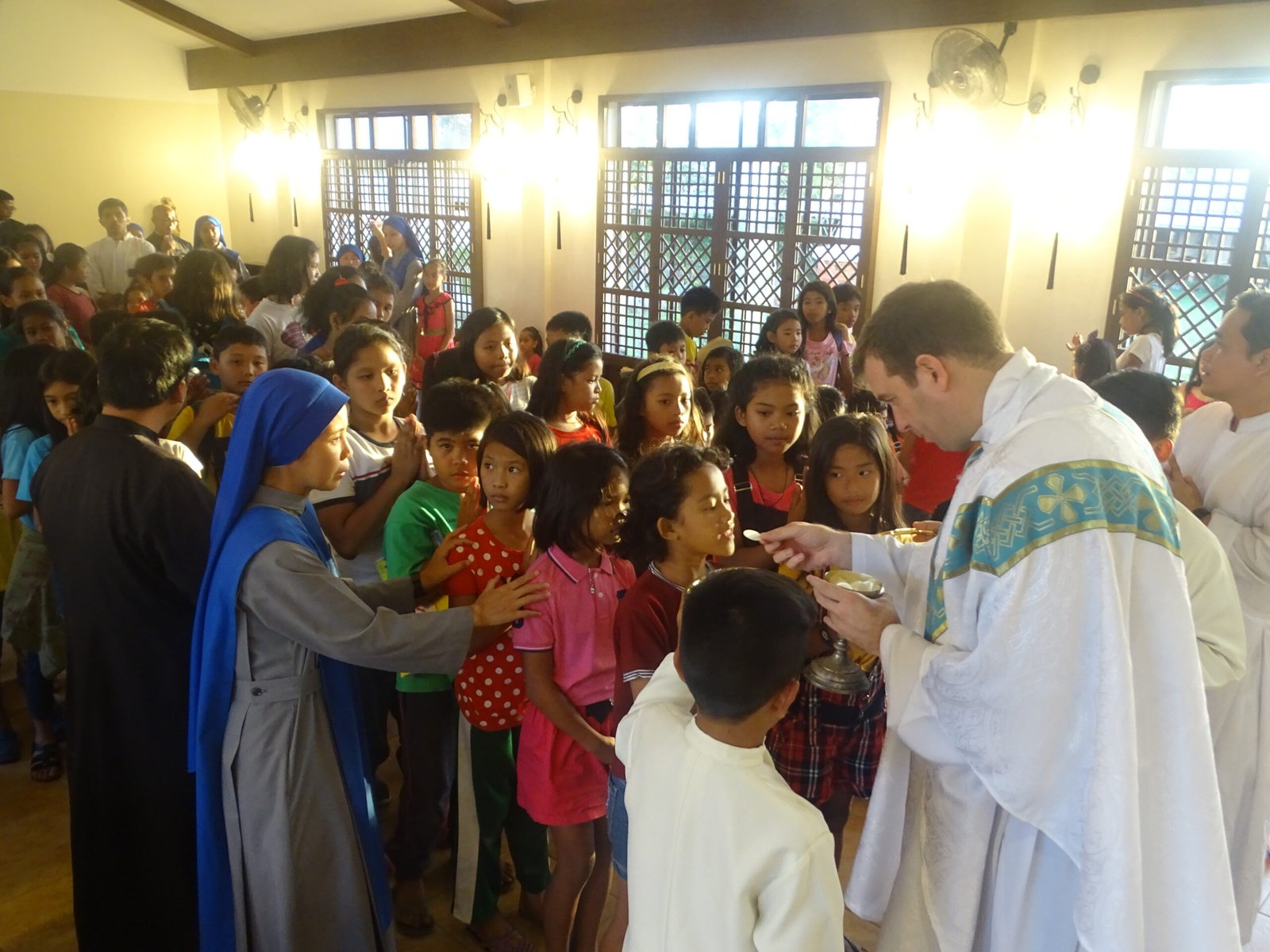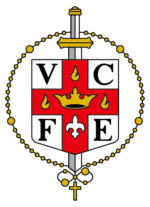IVE and John Paul II
The fundamental aspects of our charism are animated by the Magisterium of Saint John Paul the Great, whom we also consider as our spiritual father. In fact, our constitutions quotes him 1,100 times. This is not merely to decorate the document, but they are what we call the essential or ‘non-negotiable’ element-element that has been lived by our Religious Family from the very beginning and has greatly characterized us.
What is this essential element? This is embodied in the numbers 30-31 of our Constitution: “the specific charism of our Institute requires all its members to work in supreme docility to the Holy Spirit and according to the pattern of the Virgin Mary, in order that Jesus Christ may be the Lord of all that is genuinely human, even in the most difficult situations and under the most adverse conditions.
This charism is the grace to know how to work concretely in order to prolong Christ in families, education, in the mass media, in the intellectuals and in all other legitimate manifestations of human life. It is the gift to make each man ‘like an new Incarnation of the Word’ by being missionary and Marian’. This includes, primarily the profession of the vows of chastity, poverty and obedience, and Marian slavery, which constitute us as religious of the Institute of the Incarnate Word ”
John Paul II and These Elements. Many times, the great pontiff has said that the feature of the modern world is the lack of understanding of the mystery of Incarnation. Similarly to what has been accomplished by the Incarnation, when the Word assumed human nature, so also we want to work in our lives and in our apostolate in such a way that no apostolate is alien to us, precisely because nothing that is authentically human is alien to us” .
“The very foundation of the evangelization of culture is the mystery of the Incarnate Word. ‘The term acculturation or inculturation may well be a neologism, but it expresses very well one of the elements of the great mystery of the Incarnation”

Dignified celebration of the Holy Mass. One of the characteristic feature of our Institute must be the devotion to the Holy Eucharist, particularly in a worthy and reverent celebration of the Holy Mass. St. John Paul II said that “Our liturgies should be lively and alive. Lively, that is, strong, effective, and luminous. Alive, meaning that they should have life, they should be an immediate experience of Christ in the Sacrament.”
Thus it is necessary for all of us who are ministers of the Eucharist to examine carefully our actions at the altar, in particular the way in which we handle that food and drink which are the body and blood of the Lord our God in our hands: the way in which we distribute Holy Communion; the way in which we perform the purification. All these actions have a meaning of their own. Naturally, to be scrupulous must be avoided, but may God preserve us from behaving in a way that lacks respect, from undue hurry, from an impatience that causes scandal.
The clear intention to follow the teachings of St. Thomas Aquinas, as mandated by the Church, and in this context, following the best Thomists, such as Fr. Cornelio Fabro”. St. Thomas Aquinas is of central importance to our formation. He invites all men to tirelessly seek the truth, because only by investigating with perseverance, one arrives to an understanding of reality and of Him who is its Author. And to seek the Truth is one of most exciting adventures in our life.
Click here more information about our Intellectual Formation, on our “Cornelio Fabro Cultural Project” and our site on St. Thomas Aquinas (mostly in Spanish).


A Serious (not merely sensible) Spirituality. This is seen in our use of the Spiritual Exercises of St. Ignatius of Loyola. This call us to transcend the merely sensible and be willing to go through the ‘dark nights’. This is affirmed by St. John Paul II in Pastores Dabo Vobis, saying that Spiritual Exercises are an ‘opportunity for spiritual and pastoral growth, for long and quiet prayer, for a return to the roots of priestly identity, to find new motivations for fidelity and pastoral action’.
For more information about our Spiritual Exercises, click here.
Docility to the Magisterium. we consider our obedience to the Masgisterium of the Catholic Church as a necessary element for the evangelization of the culture. This is also achieved by having the Roman Spirit, wherein our members are sent to Rome for further studies: St. John Paul II said: “The formation in Rome implies the attainment of a Roman spirit, which entails a ‘crown of virtues: universal openness, fidelity to the Magisterium, a missionary spirit, longanimity and magnanimity”. Romanitá is ‘understood as the special spirit of communion with the Successor of Peter, visible Head of the Church of Christ, by means of unity of faith, and charity’.


Missionary and Apostolic Creativity. “Pastoral life is oriented ‘to communicate the charity of Christ” says the St. John Paul II. Thus, our apostolic life must be considered as our cross, not a way-of-escape: we must never fall into sterile activism, for ‘the activity for the Lord must not let us forget Who is the Lord of the activity’. We also take as our own the following words of St. John Paul II, “the lay faithful be present, as signs of courage and intellectual creativity, in the privileged places of culture, that is, the world of education — school and university, in places of scientific and technological research, the areas of artistic creativity and work in the humanities“
Strong community life and atmosphere of joy. Joy is something that has characterized our Religious Family from the very beginning. This is the fruit of lovingly accepting the cross of Christ. Joy is the gigantic secret of Christians, arising from their encounter with the Incarnate Word.
Concretely, this joy is found on our celebration of Sunday, in our sense of feasting and of our eutrapelia during our recreation times. This is essential for living the fraternal charity, as Saint John Paul II said: All the fruitfulness of religious life depends on the quality of fraternal life in common. Moreover, the ongoing renewal in the Church and in religious life is characterized by a search for communion and community’


Effective insertion to the situation where we have apostolic work. This is to ‘bite the reality’ where we are doing the mission. Saint John Paul II said “There is need for a renewed pastoral ministry of culture, because culture is the privileged place of encounter with Christ’s message. For ‘a faith that does not become culture is a faith not fully received, not entirely thought out, not faithfully lived.’ In short, faith must form the culture. That is, faith must be embodied in the life and culture of men.
The choice of mission. We prefer to do mission, above all, where missionaries might not see abundant fruits of their labor, from where vocations probably do not arise and where perhaps, if we had not accepted, no one would have been willing to go because of the difficulties. However, the silent sacrifice of those who give their lives for Christ will not go unrewarded; these missions are a huge source of blessing for the Institute and for the universal Church. Saint John Paul II said, “The renewed impulse to the mission ad gentes demands holy missionaries…What is needed is the encouragement of a new “ardor for holiness” among missionaries and throughout the Christian community,” “‘The missionary must be a ‘contemplative in action’ who finds answers to problems in the light of the Word of God by means of personal and communal prayer.”


Works of mercy, especially for the disabled. Saint John Paul II reminds those who work for the suffering that they are called ‘to strive to be ever more generous disciples of Christ the Good Samaritan. Be aware of your identity and learn to recognize in those who suffer the Face of the sorrowful and glorious Lord […] in order to be credible witnesses to Christ’s love. We are to help the sick and the suffering to configure themselves to Christ through their sufferings.
For our apostolate with persons with disability, visit the Facebook page of ‘Hogar de San Martin de Tours‘ in Argentina and “Hogar de Sagrado Corazón” (both sites in Spanish.)
A providential vision of life. This is summarized by Romans 8: 28: in everything God works for good. Saint John Paul II said, “What should be our confidence and joy in knowing that death has been conquered! Death has been overcome, thanks to the Incarnation of the Word, and his redeeming sacrifice. So the Incarnation of the Word is condition and guarantee for the entire universe. ‘The source of life and salvation from despair to all men, the condition ‘sine qua non’ and guarantee for the whole universe is contained in the words ‘The Word became flesh’ and ‘faith in these words’.’


Devotion to Blessed Virgin Mary. It is something proper to the charism, not only due to the fourth vow, our Marian Slavery according to the method of St. Louis Grignion de Monfort, but also due to the presence of the Blessed Virgin Mary in all our activities: beginning from the consecration which we renew at every Mass until the conclusion in all our celebrations with a song to the Blessed Virgin Mary. Saint John Paul II affirmed that “the surrender to Mary, in the spirit of St. Louis Grignion de Montfort, is the best means of participating fruitfully and effectively in this reality, in order to draw from it and share with others its inexpressible riches…I think we are confronted here (the slavery of love) with the sort of paradox often to be noted in the Gospels, the words ‘holy slavery’ signifying that we could not more fully exploit our freedom… For freedom is measured by the love of which we are capable’. And for this, we adopt for ourselves the motto of Saint John Paul II – Totus Tuus, Maria!
Click here to return to Formation Program
